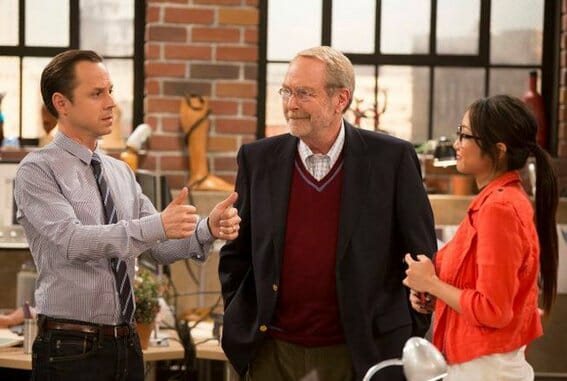
The first thing this show exemplifies is how lucky one was to graduate college a good 10 years before the economy crashed—because in an atypical twist, mid-thirties guys Eli (Seth Green) and Warner (Giovanni Ribisi) own a successful video game company and have the joy of giving their fathers room and board rather than the other way around.
The show’s introductory credits are very sentimental, displaying real photos of sons with fathers. Two points on this: One, it’s nice to see Seth MacFarlane showing a vulnerable side that he rarely reveals, and two, it’s nice to see an old-school style introductory credits sequence.The economic crisis seems to have killed off that art in shows, most likely for networks to sell more ad time. What’s so luxurious and slightly weird about this show’s introductory clip is that it does not even have one credit, just the title.
Warner is a married man with kids whose father has moved back in with him because he is hiding from the IRS. While Warner may be annoyed with his father acting like another child rather than a traditional patriarchal figure, he avoids bringing it up because his relationship with his dad works due to their “mutual non-confrontation.” His wife, Camilla, isn’t thrilled by having her father-in-law in the house because he makes more of a mess than her kids and walks around in just a towel.
Warner’s home with is stocked with his wife, kids, father and a Martha Stewart-style kitchen. Eli, in contrast, is a bachelor with no ties and a loft apartment in a fancy building with a beer pong table, dart board and random cool musical instruments. It’s the apartment every frat boy dreams of until he grows up. Eli enjoys his life this way. He wakes up in the morning at 7 a.m. with a hottie he doesn’t call his girlfriend still asleep in his bed, and he’s about to play a video game, only to be bothered by his own dad, with whom he practices maximum avoidance. His dad is such a negligent father that he not only manages to forget Eli’s birthday but also ruins his surprise party.
What the dads have in common: they’re both single, they both are poor, they annoy their sons, and they’re both quite racist.
What the dads don’t have in common: Warner’s dad comes from a high-class background; Eli’s dad not so much. Warner’s dad is obliviously annoying and non-confrontational; Eli’s dad doesn’t care who he annoys, and confrontation is his MO.
Warner and Eli have a meeting with Chinese businessmen to invest in their video game. They try to do well in the meeting by doing very stereotypical Asian things, like having their assistant dress up as a sexy Asian chick. There are a few issues here: 1) any person that would actually do that is basically pimping out their secretary (this isn’t Mad Men nor 1968) and 2) they have her dress up like a Japanese schoolgirl (similar to Sailor Moon), not a Chinese character. Any real video game aficionado should be more savvy about this character archetype.
Shockingly, all their racist gimmicks work, until Warner’s dad shows up and makes blatantly racist comments about Chinese people not being trustworthy in front of the businessmen from China. Warner’s wife, Camilla, who is Asian, overlooks the fact that her father-in-law calls Asians “orientals,” but instead is quite upset that he ruined the business meeting. To top it off, when Eli’s father shows up to Warner and Camilla’s house for Eli’s birthday celebration, he calls Camilla Warner’s maid.
Racist characters are very difficult to pull off in comedy, and they need good writing with a few key ingredients. For starters, they have to be funny. These weren’t LOL-worthy, to say the least. Secondly, they either have to be subtle, so that the straight-man characters in the show feel awkward enough to react to them, or if they’re blatant, the non-racist characters have to react. Here they are loud and obviously racist, and yet the reaction is, “Yup, that’s my racist dad. Moving on.” Finally, many fathers of that generation are not racist. They were young during the civil rights movements. They’re not from an earlier time when racism was accepted or overlooked. To have both—and thus 100 percent of— the dads on the show be incredibly racist in such overt ways misrepresents Baby Boomers, and also does not differentiate the characters enough.
Despite this major hurdle, the show still has potential. The dialogue was a little too expository at times and not so smoothly woven in to the jokes, but that’s to be expected in a pilot episode. The acting was quite good, which saves the show from a few bumps in the dialogue and the poorly executed racist jokes.
The show ends with Warner not being able to confront his dad and Eli buckling and letting his unemployed and homeless dad move in with him. So the show will continue, where every episode Warner will be pressured by his wife to confront his dad, and Eli will fight with his dad but remain unable to send him home. Hopefully at some point they will explain to their dads the difference between “oriental” and “Asian,” and maybe explain to the writers the difference between amusing racist characters and uncomfortable racist jokes.